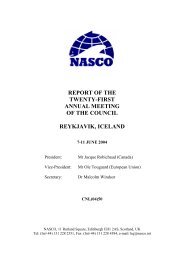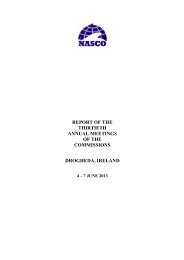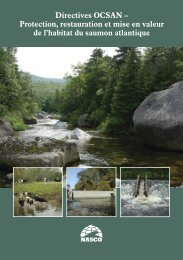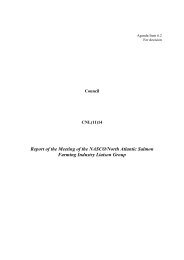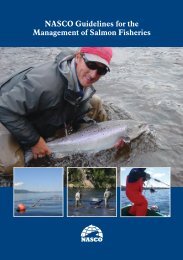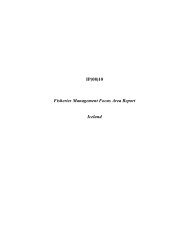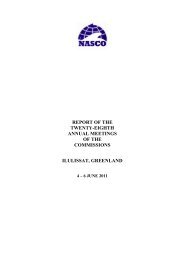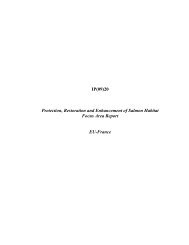Report of the 2005 ICES/NASCO Symposium on Interactions ...
Report of the 2005 ICES/NASCO Symposium on Interactions ...
Report of the 2005 ICES/NASCO Symposium on Interactions ...
Create successful ePaper yourself
Turn your PDF publications into a flip-book with our unique Google optimized e-Paper software.
NINA SPECIAL REPORT 34<br />
All kinds <str<strong>on</strong>g>of</str<strong>on</strong>g> food producti<strong>on</strong>, including aquaculture, will<br />
have some impact <strong>on</strong> <str<strong>on</strong>g>the</str<strong>on</strong>g> envir<strong>on</strong>ment. The challenge is<br />
to minimize such impacts in a way that ensures that wild<br />
and farmed salm<strong>on</strong> can co-exist, and more widely for all<br />
salm<strong>on</strong> producti<strong>on</strong> around <str<strong>on</strong>g>the</str<strong>on</strong>g> world to ensure that <str<strong>on</strong>g>the</str<strong>on</strong>g><br />
level <str<strong>on</strong>g>of</str<strong>on</strong>g> interacti<strong>on</strong> with <str<strong>on</strong>g>the</str<strong>on</strong>g> envir<strong>on</strong>ment is acceptable.<br />
Having been here for three days, listening to <str<strong>on</strong>g>the</str<strong>on</strong>g><br />
presentati<strong>on</strong>s and discussi<strong>on</strong>s, my opini<strong>on</strong> is that <str<strong>on</strong>g>the</str<strong>on</strong>g> main<br />
challenge for <str<strong>on</strong>g>the</str<strong>on</strong>g> industry is to minimize <str<strong>on</strong>g>the</str<strong>on</strong>g> number <str<strong>on</strong>g>of</str<strong>on</strong>g><br />
escapees. This will most probably also have positive<br />
influences <strong>on</strong> o<str<strong>on</strong>g>the</str<strong>on</strong>g>r areas <str<strong>on</strong>g>of</str<strong>on</strong>g> c<strong>on</strong>cern.<br />
The industry has achieved quite a lot in this area, but<br />
<str<strong>on</strong>g>the</str<strong>on</strong>g>re is room for improvement. I will <str<strong>on</strong>g>the</str<strong>on</strong>g>refore briefly<br />
comment <strong>on</strong> three areas which need to be addressed.<br />
Land-based facilities<br />
It should be possible to eliminate almost entirely escapees<br />
and leakage from hatcheries and fry and smolt producti<strong>on</strong><br />
sites. There is probably not very much science in this, but<br />
ra<str<strong>on</strong>g>the</str<strong>on</strong>g>r it involves refinement <str<strong>on</strong>g>of</str<strong>on</strong>g> technology, risk assessment<br />
and focus <strong>on</strong> risk awareness.<br />
Sea-based facilities<br />
There is a tendency towards larger units in more exposed<br />
areas when it comes to <strong>on</strong>-growing sites. The industry<br />
has taken a wide range <str<strong>on</strong>g>of</str<strong>on</strong>g> measures to reduce <str<strong>on</strong>g>the</str<strong>on</strong>g> risk <str<strong>on</strong>g>of</str<strong>on</strong>g><br />
accidents, but even if <str<strong>on</strong>g>the</str<strong>on</strong>g> number <str<strong>on</strong>g>of</str<strong>on</strong>g> escape incidents is<br />
declining, <str<strong>on</strong>g>the</str<strong>on</strong>g> size and effect <str<strong>on</strong>g>of</str<strong>on</strong>g> each incident could be<br />
larger. One requirement is to be very focused <strong>on</strong><br />
minimizing <str<strong>on</strong>g>the</str<strong>on</strong>g> probability <str<strong>on</strong>g>of</str<strong>on</strong>g> escapes occurring, and<br />
technology, moorings, nets, site selecti<strong>on</strong> and equipment<br />
are key words in this c<strong>on</strong>text. Fur<str<strong>on</strong>g>the</str<strong>on</strong>g>r R&D <strong>on</strong> escape<br />
preventi<strong>on</strong>, and also giving increasing focus to possible<br />
ways to minimize damage when accidents occur, is<br />
important. The industry is looking for practical and costeffective<br />
soluti<strong>on</strong>s. Attenti<strong>on</strong> should also be paid to o<str<strong>on</strong>g>the</str<strong>on</strong>g>r<br />
possible soluti<strong>on</strong>s to cost-effective producti<strong>on</strong> and<br />
operati<strong>on</strong>.<br />
Trickle losses<br />
An important challenge is to minimize <str<strong>on</strong>g>the</str<strong>on</strong>g> so called ‘trickle<br />
losses;’ i.e. <str<strong>on</strong>g>the</str<strong>on</strong>g> leakages <str<strong>on</strong>g>of</str<strong>on</strong>g> fish that are not being detected.<br />
R&D, surveillance, risk assessment and awareness will be<br />
<str<strong>on</strong>g>of</str<strong>on</strong>g> importance in solving <str<strong>on</strong>g>the</str<strong>on</strong>g> problem. The problem<br />
should be addressed at all life-stages, with special focus <strong>on</strong><br />
what happens around times were fish are being moved,<br />
handled or put to sea.<br />
The industry has escapees as <strong>on</strong>e <str<strong>on</strong>g>of</str<strong>on</strong>g> <str<strong>on</strong>g>the</str<strong>on</strong>g>ir main focuses.<br />
We are cooperative and transparent; we do see <str<strong>on</strong>g>the</str<strong>on</strong>g><br />
66<br />
problems and are working c<strong>on</strong>tinuously towards<br />
improvements. This happens through voluntarily acti<strong>on</strong><br />
and through fulfilment <str<strong>on</strong>g>of</str<strong>on</strong>g> regulati<strong>on</strong>s. Obligatory acti<strong>on</strong>s<br />
are probably needed in some cases. Toge<str<strong>on</strong>g>the</str<strong>on</strong>g>r with <str<strong>on</strong>g>the</str<strong>on</strong>g><br />
key words, cooperati<strong>on</strong>, regulati<strong>on</strong>, third party inspecti<strong>on</strong>s<br />
and reacti<strong>on</strong>s, R&D and cost-effective soluti<strong>on</strong>s will be <str<strong>on</strong>g>of</str<strong>on</strong>g><br />
importance. Aquaculture will in <str<strong>on</strong>g>the</str<strong>on</strong>g> future, as today, be an<br />
important part <str<strong>on</strong>g>of</str<strong>on</strong>g> internati<strong>on</strong>al food producti<strong>on</strong>. As such,<br />
<str<strong>on</strong>g>the</str<strong>on</strong>g> salm<strong>on</strong> farming industry relies <strong>on</strong> being regarded as<br />
resp<strong>on</strong>sible and with a high degree <str<strong>on</strong>g>of</str<strong>on</strong>g> credibility. This is<br />
<str<strong>on</strong>g>the</str<strong>on</strong>g> case today, and it must also be so in <str<strong>on</strong>g>the</str<strong>on</strong>g> future.<br />
Addressing <str<strong>on</strong>g>the</str<strong>on</strong>g> challenge <str<strong>on</strong>g>of</str<strong>on</strong>g> minimizing escapees will be a<br />
part <str<strong>on</strong>g>of</str<strong>on</strong>g> this.<br />
4. Jens Christian Holm<br />
First <str<strong>on</strong>g>of</str<strong>on</strong>g> all - C<strong>on</strong>veners and members <str<strong>on</strong>g>of</str<strong>on</strong>g> <str<strong>on</strong>g>the</str<strong>on</strong>g> Steering<br />
Committee - c<strong>on</strong>gratulati<strong>on</strong>s to you - this has been an<br />
interesting symposium dealing with some very serious<br />
questi<strong>on</strong>s.<br />
For me - representing <str<strong>on</strong>g>the</str<strong>on</strong>g> regulati<strong>on</strong> side <str<strong>on</strong>g>of</str<strong>on</strong>g> aquaculture<br />
in Norway - a lot <str<strong>on</strong>g>of</str<strong>on</strong>g> <str<strong>on</strong>g>the</str<strong>on</strong>g> messages from this symposium<br />
(both questi<strong>on</strong>s and results) relate to <str<strong>on</strong>g>the</str<strong>on</strong>g> increasing size <str<strong>on</strong>g>of</str<strong>on</strong>g><br />
our salm<strong>on</strong> industry. Industrialising a biological process<br />
very <str<strong>on</strong>g>of</str<strong>on</strong>g>ten means increasing <str<strong>on</strong>g>the</str<strong>on</strong>g> size scale.<br />
Size matters. The number <str<strong>on</strong>g>of</str<strong>on</strong>g> salm<strong>on</strong> in <strong>on</strong>e large farm<br />
can be higher than <str<strong>on</strong>g>the</str<strong>on</strong>g> total number <str<strong>on</strong>g>of</str<strong>on</strong>g> wild Atlantic<br />
salm<strong>on</strong> present in <str<strong>on</strong>g>the</str<strong>on</strong>g> sea originating from all Norway’s<br />
salm<strong>on</strong>-producing rivers. The maximum biomass allowed<br />
in Norway’s 864 licences for commercial <strong>on</strong>-growing <str<strong>on</strong>g>of</str<strong>on</strong>g><br />
Atlantic salm<strong>on</strong>, trout and rainbow trout, is approximately<br />
690,000 metric t<strong>on</strong>nes.<br />
Net pen size, farm size and <str<strong>on</strong>g>the</str<strong>on</strong>g> number <str<strong>on</strong>g>of</str<strong>on</strong>g> farmed fish in<br />
most regi<strong>on</strong>s have increased in our aquaculture industry in<br />
recent years.<br />
Larger netpens can result in larger numbers <str<strong>on</strong>g>of</str<strong>on</strong>g> escapees if<br />
<str<strong>on</strong>g>the</str<strong>on</strong>g> pen is destroyed. A larger group <str<strong>on</strong>g>of</str<strong>on</strong>g> farmed salm<strong>on</strong> is<br />
hard to manage if <str<strong>on</strong>g>the</str<strong>on</strong>g> technology and operati<strong>on</strong>al<br />
procedures used are not adjusted. Medical treatment is<br />
not easy in super-large units; obtaining <str<strong>on</strong>g>the</str<strong>on</strong>g>rapeutic dosage<br />
for all individuals by oral administrati<strong>on</strong> will be almost<br />
impossible and resistance may be <str<strong>on</strong>g>the</str<strong>on</strong>g> result.<br />
Larger farms holding higher numbers <str<strong>on</strong>g>of</str<strong>on</strong>g> fish in a small area<br />
will generally increase <str<strong>on</strong>g>the</str<strong>on</strong>g> risk <str<strong>on</strong>g>of</str<strong>on</strong>g> disease. And if a serious<br />
disease outbreak occurs, <str<strong>on</strong>g>the</str<strong>on</strong>g> number <str<strong>on</strong>g>of</str<strong>on</strong>g> mortalities can be<br />
so high that nei<str<strong>on</strong>g>the</str<strong>on</strong>g>r <str<strong>on</strong>g>the</str<strong>on</strong>g> fishfarmer nor society have an<br />
adequate infrastructure to tackle it. And sometimes a<br />
whole fish farm might collapse in extreme rough wea<str<strong>on</strong>g>the</str<strong>on</strong>g>r<br />
or if a ship collides with it.



